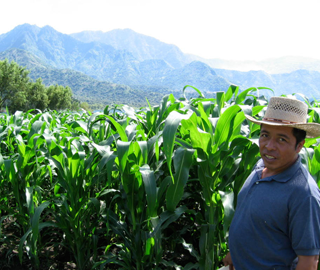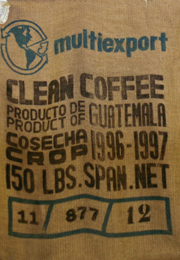by Rebekah Tilley
Ever since the night American colonists tossed tea into Boston Harbor, we have been a nation of coffee consumers. The rich, dark smell of coffee is part of our morning ritual and its caffeine has fueled many late night projects. Sarah Lyon, assistant professor of anthropology, follows coffee back to the source by studying coffee farmers and the impact of fair trade practices in the Central American region.
 The fair trade movement is a fairly recent phenomenon that seeks to give local producers a fair price for their commodity. Lyon focuses her research on coffee-producing communities in Guatemala, and her work sheds light on the ways sustainable trade has impacted these communities for better and for worse. Along the way, Lyon has developed a passion for the product as well. “I’ve become very partial to Central American coffees,” said Lyon, “I find them very bright tasting – the volcanic soil and the high altitude produce very bright, high quality coffees.”
The fair trade movement is a fairly recent phenomenon that seeks to give local producers a fair price for their commodity. Lyon focuses her research on coffee-producing communities in Guatemala, and her work sheds light on the ways sustainable trade has impacted these communities for better and for worse. Along the way, Lyon has developed a passion for the product as well. “I’ve become very partial to Central American coffees,” said Lyon, “I find them very bright tasting – the volcanic soil and the high altitude produce very bright, high quality coffees.”
At its core, the primary benefit of fair trade in these communities is it gives a cooperative group of farmers a reliable source of income in a notoriously volatile market. Further, Lyon found that the very act of establishing a cooperative organization has allowed groups of Guatemalan farmers to overcome the oppression of a government that for years regularly attacked organized groups of citizens, especially indigenous communities during the country’s 30-year-long civil war.
“The relationships that the cooperative was forming through fair trade meant that they were having these international visitors coming down,” explained Lyon. “For example, they had the coffee roaster coming down once a month to check on the coffee quality. These international ties gave them a sense that they were protected. It was acceptable to organize because, were the government to come out against them, they felt protected due to their international connections. In this specific case study in Guatemala, it gave them a freedom and a space for an emerging participatory democracy.”
Additionally, these connections with international roasters and coffee importers in the United States and Europe provide feedback to the farmers in the interest of helping them improve their coffee quality. And farmers within an organized fair trade market are more likely to have access to credit as participation in these markets serves to validate these farmers in the eyes of lenders.
Lyon’s research closely examines how equitably the effects of fair trade are distributed across gender and socio-economic lines. “It’s a mixed bag,” Lyon admits. “In some communities, it’s really just enforcing existing gender inequities, which is problematic. In other communities, there are some spaces for women to participate.” Her research has demonstrated the importance of tailoring fair trade gender equity standards to each unique culture. In one community, Lyon found that the agricultural work associated with coffee farming was considered unacceptable for women, yet one of the main draws of the fair trade market in that community was that it would potentially provide opportunities for women in the community to sell their textile products.
 Walk into any Starbucks today and you’ll be given the message that, with the purchase of your $1.95 venti cup of Breakfast Blend, you are directly aiding a downtrodden local farmer in Central American or the East Africa. Ironically, the fair trade movement effectively forced large coffee corporations like Starbucks and Dunkin’ Donuts to adopt the bare minimum of sustainable practices, and those organizations have successfully used fair trade to “green wash” their corporate image.
Walk into any Starbucks today and you’ll be given the message that, with the purchase of your $1.95 venti cup of Breakfast Blend, you are directly aiding a downtrodden local farmer in Central American or the East Africa. Ironically, the fair trade movement effectively forced large coffee corporations like Starbucks and Dunkin’ Donuts to adopt the bare minimum of sustainable practices, and those organizations have successfully used fair trade to “green wash” their corporate image.
“This idea of green washing is Starbucks basically sells a small percentage of their coffee certified fair trade, but then consumers are left with this idea that it’s all fair trade. So, Starbucks ends up with this halo of wonderfulness by association. Sadly, in a lot of consumers’ minds, Starbucks became synonymous with fair trade because people only heard about fair trade in the first place through Starbucks. Which is even sadder when you consider all the other coffee roasters out there that are 100 percent committed to the fair trade model,” Lyon said.
Want to be sure you’re buying 100 percent fair trade coffee? Look for the FLO (Fairtrade Labelling Organizations International) sticker on coffee beans sold in stores from Whole Foods to Kroger.
The greatest challenge for the fair trade movement going forward, Lyon notes, is that it is simply too small. “It needs to be one strategy among many because it’s never going to be big enough to absorb all the small farmers of all the commodities in the world,” said Lyon. “One of the things that makes it cool is it unites people across the spectrum. It can potentially unite producers with consumers with business people with development agencies with university students.”
photos by Richie Wireman
Guatemalan farmer photo courtesy of Sarah Lyon
